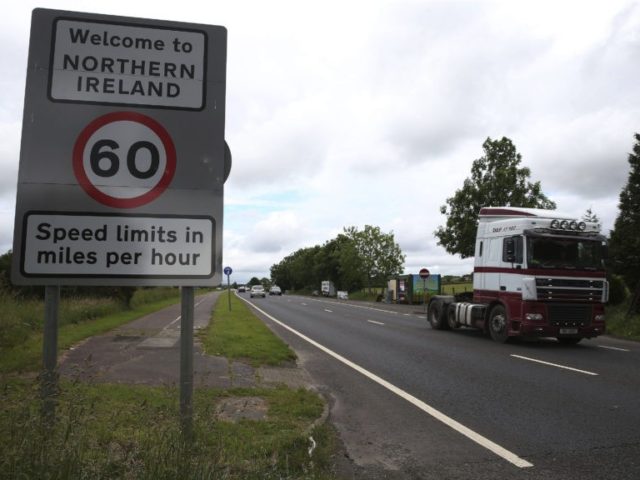This morning’s key headlines from GenerationalDynamics.com
- The issue of Ireland’s border threatens to collapse EU-UK Brexit negotiations.
- Ireland’s government faces vote of no confidence on Wednesday
The issue of Ireland’s border threatens to collapse EU-UK Brexit negotiations.

Border checkpoint between Sweden, which is in the European Union, and Norway, which is NOT in the EU. (Sky News)
European Union Brexit negotiators are demanding that, by December 4, the UK must provide written commitments in three areas, having to do with EU citizens working in the UK, money the UK must pay to the EU, and the border between Northern Ireland and the Republic of Ireland.
Without those written commitments, the EU says that it will not allow negotiations on the trade UK-EU trade relationship after Brexit occurs to begin at a summit meeting on December 13-14.
Without being able to start trade negotiations on December 13, the UK says that it may pull out of Brexit negotiations, and allow a “hard Brexit” to occur, where the UK will be a completely separate country, with no direct relationship at all with the EU except as specified by international organizations like the World Trade Organization (WTO).
Leo Varadkar, the prime minister of Ireland, has made the EU demand explicit:
We’ve been given assurances that there will be no hard border in Ireland, that there won’t be any physical infrastructure, that we won’t go back to the borders of the past.
We want that written down in practical terms in the conclusions of phase one [by December 14].
Liam Fox, the UK’s chief Brexit negotiator, says that the UK will not be able to provide a committed solution to the Irish border problem in time to meet the EU and Irish demands. Fox says that the Irish border problem cannot be solved until trade negotiations are well underway. The EU says that trade negotiations cannot get underway until the Irish border problem is solved. Chicken and eggs for breakfast, anyone?
Northern Ireland is a part of the UK. Southern Ireland, the Republic of Ireland or just Ireland, is a separate nation, and a member nation of the European Union. Today, both Northern Ireland and Ireland are part of the European Union, and there is no visible border between the two. Goods and people can travel freely between them.
If the UK leaves the EU, then Northern Ireland and Ireland will be in two different countries, and there would have to be border controls between them: watchtowers, border posts, visa and passport checks at ports and airports, and tariffs on imported goods.
Leaders of all the parties – the UK, the EU, Northern Ireland, the Republic of Ireland – agree that the invisible border must remain invisible. The problem is that no one can figure out how to do that if Brexit is to occur.
The border issue goes beyond watchtowers and border posts, because of the decades of violence known as “The Troubles,” where there were violent clashes between the indigenous ethnic Irish Gaelics (the Catholics) and the descendants of the English and Scottish invaders (the Protestants). These clashes were resolved only 20 years ago by the 1998 Good Friday Agreement (the Belfast Agreement) that among other things, eliminated the hard border, turning it into an “invisible border” that anyone can cross at any time. Many people are expressing concerns that a new hard border would bring about a return to The Troubles. BBC and Reuters and Irish Times and Guardian (London) and NY Review of Books
Ireland’s government faces vote of no confidence on Wednesday
Leo Varadkar, the prime minister of Ireland, is facing a vote of no confidence on Wednesday that could lead to the collapse of his government and force new elections before Christmas, possibly further complicating the Brexit negotiations.
In 2015, Sergeant Maurice McCabe became a whistleblower and came forward to report several issues involving corruption in the Garda, Ireland’s National Police Force. Officials in the Garda allegedly tried to undermine McCabe’s testimony with a phony sexual abuse accusation.
A May, 2014, e-mail message to then-Minister of Justice Frances Fitzgerald has emerged, suggesting that she was aware of the phony charges, but did nothing about them. Fitzgerald says that she may have read the e-mail message, but forgot it because it recommended she take no further action.
Frances Fitzgerald is currently Ireland’s deputy premier, and Varadkar’s opposition is demanding that she resign.
Varadkar is now in intense negotiations with the opposition:
We are trying to find a middle way that allows the Government to continue and continue with the important work we are doing, particularly with Brexit and ensuring that we have necessary legislation through. We are doing everything we can.
If no compromise is reached, then a motion of no confidence will be offered on Tuesday night. If the government collapses, then Varadkar will be a caretaker prime minister when he travels to Brussels for the December 13-14 Brexit summit. Belfast Telegraph and Bloomberg and Independent (Ireland) and Ireland Joe
Related Articles
- European Union Brexit negotiator gives Britain a two-week ultimatum (11-Nov-2017)
- Sectarian violence in Northern Ireland grows again (23-Jun-2011)
- England threatened with IRA terrorists from Northern Ireland (12-May-2016)
- European Union lays out demands for Britain over Brexit negotiations (30-Apr-2017)
- Brexit: The die is cast, and the EU is playing hardball (31-Mar-2017)
KEYS: Generational Dynamics, Ireland, Northern Ireland, United Kingdom, European Union, Brexit, Leo Varadkar, Liam Fox, Good Friday Agreement, Belfast Agreement, The Troubles, Maurice McCabe, Frances Fitzgerald Generational Dynamics, Ireland, Northern Ireland, United Kingdom, European Union, Brexit, Leo Varadkar, Liam Fox, Good Friday Agreement, Belfast Agreement, The Troubles, Maurice McCabe, Frances Fitzgerald
Permanent web link to this article
Receive daily World View columns by e-mail

COMMENTS
Please let us know if you're having issues with commenting.